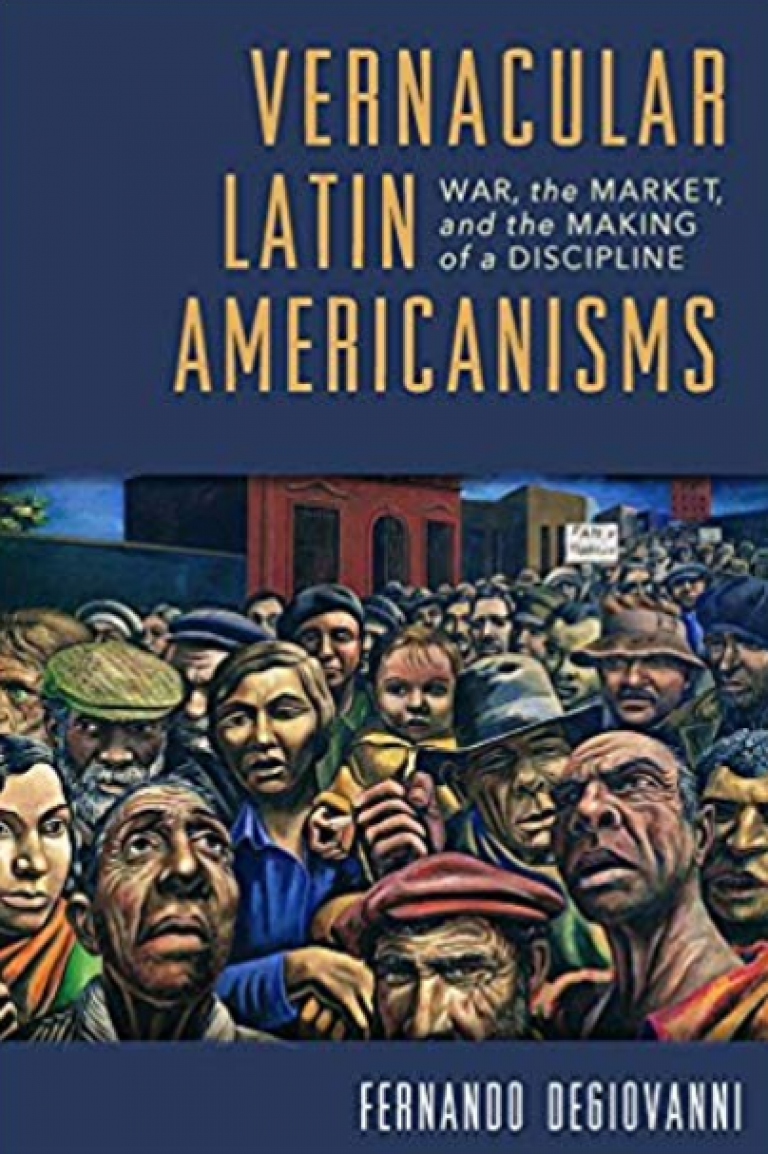Vernacular Latin Americanisms: War, the Market, and the Making of a Discipline
29 January 2020, 5:30 pm–7:00 pm

In this seminar, Fernando Degiovanni, Professor in Latin American, Iberian, and Latino Cultures, CUNY, will discuss his most recent book with Mark Thurner (ILAS, University of London) and Nicola Miller (History, UCL)
This event is free.
Event Information
Open to
- All
Availability
- Sold out
Cost
- Free
Organiser
-
UCL Institute of the Americas
Location
-
Lecture Room 103Institute of the Americas51 Gordon SquareLondonWC1H 0PN
Listen to the podcast here
In this seminar, Fernando Degiovanni, Professor in Latin American, Iberian, and Latino Cultures, CUNY, will discuss his recent book, Vernacular Latin Americanisms: War, the Market, and the Making of a Discipline (Pittsburgh, 2019) with Mark Thurner (ILAS, University of London) and Nicola Miller (History, UCL).
About the book:
In Vernacular Latin Americanisms, Fernando Degiovanni offers a long-view perspective on the intense debates that shaped Latin American studies and still inform their function in the globalized and neoliberal university of today. By doing so he provides a reevaluation of a field whose epistemological and political status has obsessed its participants up until the present. The book focuses on the emergence of Latin Americanism as a field of critical debate and scholarly inquiry between the 1890s and the 1960s.
Drawing on contemporary theory, intellectual history, and extensive archival research, Degiovanni explores in particular how the discourse and realities of war and capitalism have left an indelible mark on the formation of disciplinary perspectives on Latin American cultures in both the United States and Latin America.
Questioning the premise that Latin Americanism as a discipline comes out of the tradition of continental identity developed by prominent intellectuals such as José Martí, José E. Rodó or José Vasconcelos, Degiovanni proposes that the scholars who established the discipline did not set out to defend Latin America as a place of uncontaminated spiritual values opposed to a utilitarian and materialist United States. Their mission was entirely different, even the opposite: giving a place to culture in the consolidation of alternative models of regional economic cooperation at moments of international armed conflict. For scholars theorizing Latin Americanism in market terms, this meant questioning nativist and cosmopolitan narratives about identity; it also meant abandoning any Bolivarian project of continental unity or of socialist internationalism.
About the Speakers
Fernando Degiovanni is the author of Los textos de la patria: Nacionalismo, políticas culturales y canon en Argentina (Beatriz Viterbo Editora, 2007) and Vernacular Latin Americanisms: War, the Market, and the Making of a Discipline (University of Pittsburgh Press, 2018), a book that explores the competing agendas that shaped the emergence of Latin Americanism as a field of critical debate and scholarly inquiry between the 1890s and the 1960s. He has also guest-edited the dossier Comunidades y relatos del libro en América Latina (2015). His articles have appeared in numerous journals, including Revista Iberoamericana, Revista de Crítica Literaria Latinoamericana, Journal of Latin American Cultural Studies, Variaciones Borges, Hispamérica, and Cuadernos Hispanoamericanos, as well as in major reference works such as A Companion to Latin American Literature and Culture, edited by Sara Castro-Klaren, and Historia crítica de la literatura argentina, edited by Noé Jitrik.
Mark Thurner is an internationally recognized senior scholar in the fields of Latin American History and Anthropology. Mark joined ILAS and SAS in 2014. His current research concerns the history and theory of historiography and museography in Latin America and Europe. His books include El nombre del abismo: meditaciones sobre la historia de la historia (Instituto de Estudios Peruanos, 2012), History’s Peru: The Poetics of Colonial and Postcolonial Historiography(University Press of Florida, 2011), Republicanos Andinos (Instituto de Estudios Peruanos, 2006), Sebastian Lorente: Escritos fundacionales de historia peruana (Universidad Nacional Mayor de San Marcos, 2005), After Spanish Rule: Postcolonial Predicaments of the Americas (Duke, 2003), and From Two Republics to One Divided: Contradictions of Postcolonial Nationmaking in Andean Peru (Duke 1997).
Nicola Miller is Professor of Latin American History at UCL. She is interested in the intellectual, cultural, political and international history of the Americas, in comparative and transnational perspectives; and in nationalism and national identity, especially in the Americas. Her current research focuses on the history of knowledge in Latin America. Her books include Republics of Knowledge, Princeton University Press, forthcoming; America Imagined: Explaining the United States in Nineteenth-Century Europe and Latin America, ed. with Axel Körner and Adam Smith, Palgrave Macmillan, New York and London, 2012; and Reinventing Modernity in Latin America: Intellectuals Imagine the Future, 1900-1930, Palgrave Macmillan, New York and London, 2008.
 Close
Close

